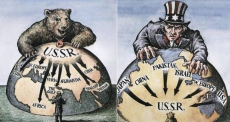
The role of a select few individuals is also vital to the consideration of the origins of the Cold War. US President Roosevelt and UK Prime Minister Churchill met on a ship in the Atlantic in August 1941 to discuss plans for the post war world that would represent the ideals of the Western powers. It is notable that Stalin was not invited and the USSR signed the treaty in September with all the other allied powers. This act created unnecessary tensions by making it clear that the USSR were not considered a crucial ally post war and, considering Stalin’s paranoid nature, it was quite a foolish move by the West in terms of foreign policy. Excluding this one instance however, Roosevelt and Stalin grew closer over the war years and Roosevelt even said that he did not consider Communism under Stalin a threat, certainly not in comparison to fascism under Hitler and Mussolini. Unfortunately in 1945 Roosevelt died and was replaced by Harry Truman, a young Democrat with pressure upon him to not bow down to Communism. Influenced especially by ambassador Averell Harriman who considered USSR growth as a ‘barbarian invasion’, Truman was aggressive and rude in his meeting with Soviet ambassador Molotov, boasting the US possession of the atomic bomb and undoubtedly heightening tensions greatly. In fact Harriman assured Truman, arguing that the USSR could not react aggressively to a harder US response because they required economic aid from the West. In reality an arms race commenced that would see the continual betterment in weapons of mass destruction between East and West until finally in the 1960s there was a consensus of M.A.D (mutually assured destruction). Had FDR’s (Franklin .D. Roosevelt’s) working relationship with Stalin been continued then perhaps the war might never have escalated to the point that it did. Though this is of course only speculation, Stalin was diagnosed as paranoid and perhaps even bipolar according to his doctor so although appeasing aggression might in most instances be a poor decision, confronting a man of Stalin’s disposition head on was clearly a mistake, and so we can see how failure to understand individual personalities was a key player in the origins of the Cold War. It is important perhaps at this point to reiterate that this paper is not condemning the US in its actions if it may seem that way, it is just that due to the lack of Russian sources we are somewhat forced to critically analyse US actions in considering the Cold War’s origins.
IMAGE: http://www.a-w-i-p.com/media/blogs/articles/1/1/I/cold-war-imperialism_US_USSR.jpg?mtime=1374642786

0 Comment:
Be the first one to comment on this article.